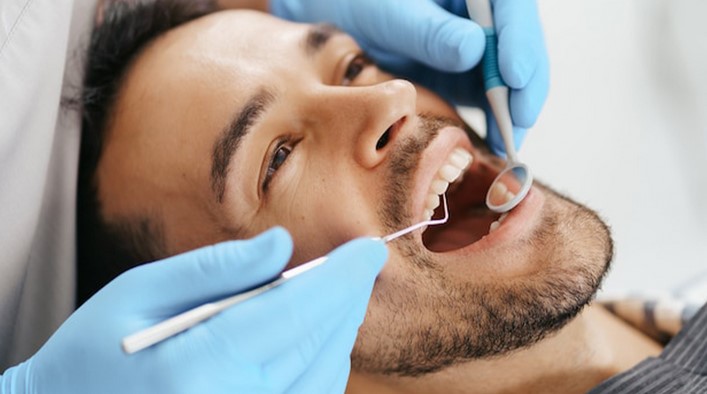Calculus teeth, also known as dental calculus or tartar, are mineralized deposits that form on the teeth due to the accumulation of plaque and bacteria. These hardened deposits can lead to various dental issues if not properly managed through regular oral hygiene practices and professional dental care.

Maintaining good oral health is essential for overall well-being. Dental hygiene goes beyond the simple task of brushing and flossing; it encompasses a deeper understanding of various oral health concerns. One of the significant issues that individuals often face is calculus build-up, which can have a notable impact on dental health. In this article, we delve into the world of calculus build-up, its connection to dental health, and how preventive measures can help combat this problem.
What is Calculus Build-up?
Calculus, also known as tartar, is a hard deposit that forms on teeth due to the accumulation of mineralized plaque. Plaque is a sticky film of bacteria that constantly forms on teeth and gums. When plaque isn’t adequately removed through regular brushing and flossing, it mineralizes over time, turning into calculus. Unlike plaque, which is soft and can be removed with proper oral hygiene practices, calculus is hard and firmly attached to the teeth. Its rough surface provides an ideal environment for more plaque to accumulate, leading to a vicious cycle of dental problems.
The Role of Calculus in Dental Health
Calculus build-up can have a profound impact on dental health. One of the primary concerns is gum disease. The rough texture of calculus makes it an ideal surface for bacteria to cling to. These bacteria release toxins that irritate the gums, leading to inflammation and the development of gingivitis. If left untreated, gingivitis can progress to more severe forms of gum disease, known as periodontitis. Periodontitis can result in gum recession, bone loss, and even tooth loss.
Furthermore, calculus build-up can also contribute to dental cavities. The presence of calculus near the gumline can create pockets where food particles and bacteria get trapped. This environment promotes the formation of cavities as the bacteria feed on sugars and release acids that erode the tooth enamel. Over time, this can lead to decay and the need for dental fillings or even more extensive dental procedures.
Understanding the Link
The link between calculus build-up and dental health is a complex one. It’s not just about the presence of calculus but also about the environment it creates within the mouth. The rough surface of calculus provides an ideal substrate for bacterial growth, which can then lead to various oral health problems. Additionally, the irritation caused by the toxins released by these bacteria can lead to inflammation of the gums, setting the stage for gum disease.
Another aspect of the link between calculus build-up and dental health is the impact on overall oral hygiene. Calculus can make it more challenging to clean teeth effectively, as its hard surface requires professional dental tools to remove. This can lead to a vicious cycle, where calculus hinders proper cleaning, and improper cleaning leads to more calculus accumulation. Therefore, addressing calculus build-up is not only about treating the existing deposits but also about improving oral hygiene practices to prevent its recurrence.
Preventive Measures
Prevention is undoubtedly the best approach when it comes to calculus build-up and dental health. Here are some essential preventive measures to consider:
1. Brushing and Flossing: Regular and proper brushing and flossing are crucial for removing plaque, the precursor to calculus. Brushing at least twice a day and flossing daily can significantly reduce the chances of calculus formation.
2. Professional Dental Cleanings: Regular visits to the dentist for professional cleanings are essential. Dental professionals have the tools and expertise to effectively remove calculus deposits and provide guidance on maintaining oral hygiene.
3. Antimicrobial Mouthwash: Using an antimicrobial or antibacterial mouthwash can help control bacterial growth in the mouth, reducing the likelihood of calculus formation.
4. Healthy Diet: A diet low in sugary and starchy foods can contribute to better oral health. These types of foods provide a ready source of nutrition for bacteria, promoting their growth and acid production.
5. Hydration: Drinking water throughout the day helps to flush away food particles and bacteria, maintaining a cleaner oral environment.
6. Proper Technique: Using the right brushing and flossing techniques is essential. Your dentist can guide you on the proper methods to ensure effective cleaning.
Understanding the link between calculus build-up and dental health underscores the importance of maintaining good oral hygiene practices. Calculus build-up isn’t merely an aesthetic concern; it has a direct impact on gum health, cavity formation, and overall oral well-being. By adopting preventive measures and following proper oral hygiene practices, individuals can significantly reduce the risk of calculus formation and its associated dental problems. Regular visits to the dentist for professional cleanings and guidance further enhance the chances of maintaining a healthy and confident smile.